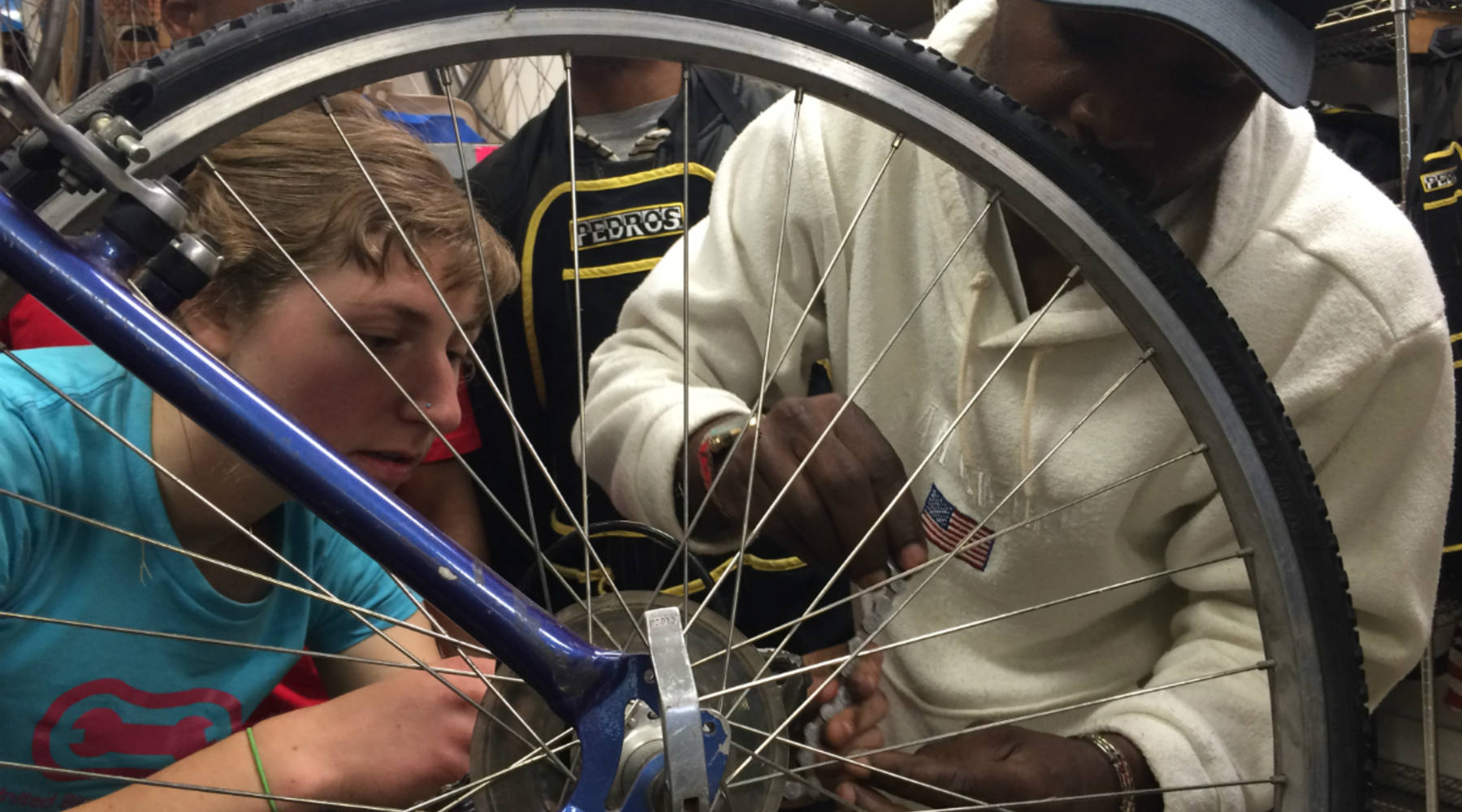
Bicycle classes help Maine refugees get around town

Riding a bike, for some people, is strictly recreational. For others, it’s a necessity.
If you don’t own a car, either because it’s cost-prohibitive, or because your immigration status – like being undocumented or an asylum seeker – creates a lengthy wait for a license, bicycling can be both a necessity and fun.
In Portland, Maine, there’s a class called Bikes for All Mainers where people are learning mechanics, maintenance and traffic safety. The classes, which are open to anyone, are held at the Portland Gear Hub, a nonprofit bike shop, and are in partnership with the Bicycle Coalition of Maine. They are so popular that there is a waiting list.
Papy David Musongela’s purple commuter bike is up on a stand in a back room. He is running through the gears with instructor Coco Kazadi. It’s a crash-course – or the opposite, actually – on how to be safe and savvy on two wheels.
Participants in the Bikes for All Mainers class work with instructors Ainsley Judge (far right) and Coco Kazadi (far left).
“We don’t always have the traffic signs or rules, or the same traffic signs and rules,” Kazadi said. “So we need to be familiarized with what’s happening here.”
Kazadi and Musongela both moved to the U.S. from the Democratic Republic of Congo and are seeking asylum, the legal process towards citizenship.

Coco Kazadi, instructor for the Bikes for All Mainers class.
They speak to one another in Lingala. Kazadi helps translate for Musongela.
“Yeah, it’s everything. It helps in many, many ways,” Musongela said. “Pleasure, going around, work. Like me, I don’t have a car, so I use my bike.”
Kazadi graduated from the program last year, and is now an instructor in the class, assisting students and helping plan the classes.
“The bicycle is the best,” he said. “You don’t have difficulties for parking, you don’t pay for petrol. And of course, the pleasure – especially the pleasure. Every time I’m on the road, I have a smile on my face.”
Immigrants are twice as likely as U.S.-born Americans to travel by bicycle, according to a 2013 League of American Bicyclists report.
However, Alex Doty, executive director of the League of American Bicyclists added, “Bicycling rates go down significantly the longer immigrants stay in the U.S.”
Doty said this highlights the need to make people feel safe on the roads, and to provide the proper conditions and facilities that encourage people to continue cycling even when other transportation options are available.
Ainsley Judge, a Bikes for All Mainers mechanics instructor and program coordinator, said “This is the first class I’ve taught where only half of the students understand half of what I’m saying.”
But she said the lack of a common language in class does not get in her way.

Sam Kaking, a student in the Bikes for All Mainers class.
“You can use your hands to describe a lot of things,” she added. “And you can point and you can use other language tools.”
Class participant Sam Kaking says he rode a bike at home in the Congo, but hasn’t bicycled here in Portland yet. He already has plans to use his bike after he completes the program, “…going to shopping mall, going to school for language, going to meet my lawyers.”
And he said the bike has another advantage for asylum seekers.
“When you get here, you don’t have a car. You still have to go for a driving license and it take much longer than having a bike. Within a month you can have a bike and you can start moving around,” Kaking said.
At the end of the program, participants earn the bike they have fixed up and learned to ride.
“So you guys have finished your two mechanic sessions. So, good job,” Judge said, as the class clapped and cheered. “Did you learn something about your bike?”
There’s a lot happening in the world. Through it all, Marketplace is here for you.
You rely on Marketplace to break down the world’s events and tell you how it affects you in a fact-based, approachable way. We rely on your financial support to keep making that possible.
Your donation today powers the independent journalism that you rely on. For just $5/month, you can help sustain Marketplace so we can keep reporting on the things that matter to you.


















